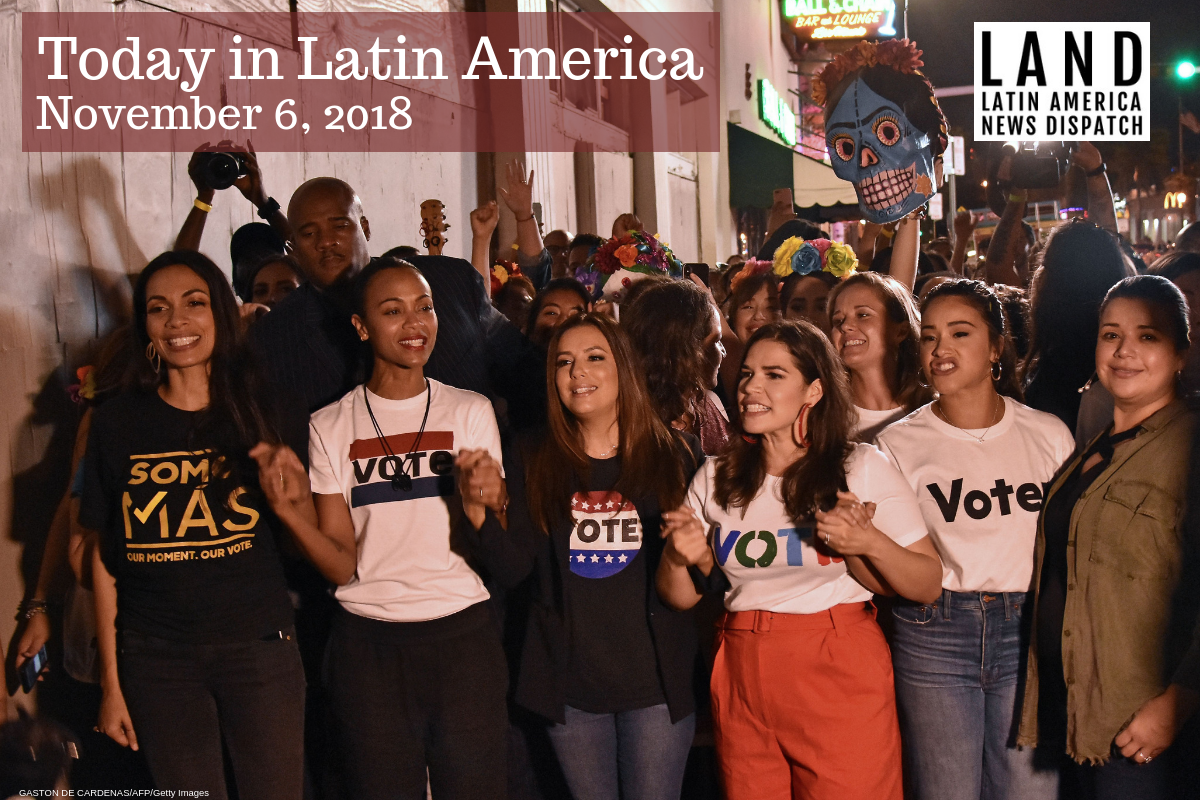

(L-R) Actresses Rosario Dawson, Zoe Saldana, Eva Longoria, America Ferrera and Gina Rodriguez march down Calle Ocho during ‘Latinas en Marcha’, an election rally with other Latin American celebrities. Miami, Florida. November 4, 2018.(Photo by Gaston de Cardenas/AFP/Getty Images)
UNITED STATES: The midterm elections are today, and Latino voters are poised to make a big impact. Leading up to the election, more Hispanic voters than four years ago said they have given “quite a lot” of thought about the election, according to a Pew Research Center survey. Despite this, voter turnout among the Latino population is still lower than the population as a whole. Eva Longoria, Zoe Saldana, and Gina Rodriguez were among a group of Latino celebrities who rallied crowds in Miami Sunday in an effort to improve turnout.
With more than 29 million Latinos eligible to vote, making up nearly 13 percent of all voters, they could sway several races, particularly in California, Texas and Florida, where the largest populations of Latino voters live. The number of Latinos who say their situation in the United States has worsened under Trump has risen from 32 percent shortly after he was elected to 47 percent just before the midterms, according to another recent Pew survey. Two-thirds of the group surveyed said the Trump administration’s policies have been harmful to them.
HEADLINES FROM THE WESTERN HEMISPHERE
NORTH AMERICA
MEXICO: Mexican legislators capped the salary of government officials so it can be no higher than that of the president, with a few exceptions, according to a document published yesterday in the official gazette. The decree also cancels pensions for former presidents, unless they are assigned by law. Both changes were part of President-elect Andrés Manuel López Obrador’s campaign platform to reduce government spending. The legislative changes will be put into effect today.
MEXICO: A maintenance water cutoff in Mexico City that began on Wednesday and was expected to last until today will be extended by two days due to a malfunction of a newly installed part, according to authorities. The water cutoff, or Megacorte, is estimated to have affected more than 7 million people. City officials are supplying water trucks to the hardest-hit areas.
MEXICO: President-elect Andrés Manuel López Obrador met with contractors of the now-canceled New Mexico City Airport yesterday to “soothe” contractors and discuss options for moving ahead. Guadalupe Phillips, CEO of the construction company Empresas ICA, said that contractors are willing to work with the government to come up with an orderly solution. One solution previously mentioned by López Obrador, and backed by Phillips, is the transfer of contracts to the construction of an airport in the Santa Lucía Air Force Base.
CENTRAL AMERICA
HONDURAS & GUATEMALA: The leaders of the two countries said there should be an investigation into who organized the migrant caravan traveling through Mexico toward the United States. Honduras’ President Juan Orlando Hernándezsaid the organizers should be held responsible for “violating the migratory laws of various countries.” Hernández met with Guatemalan President Jimmy Morales in the Honduran capital yesterday. The two presidents noted that many of the migrants have returned, but Mexico City received thousands of others in a sports stadium yesterday.
THE CARIBBEAN
NORTH KOREA & CUBA: Cuba’s president Miguel Díaz-Canel met with North Korean leader Kim Jong Un in Pyongyang yesterday. North Korea’s state-run media said the two leaders are working to improve their countries’ relations. Díaz-Canel arrived from Moscow, where he and Russian President Vladimir Putin gave a joint statement criticizing U.S. sanctions. Secretary of State Mike Pompeo is set to meet with North Korea’s top diplomat this week. Díaz-Canel was scheduled to leave Pyongyang today and travel to China, Vietnam and Laos.
ANTIGUA & BARBUDA: Voters will decide today whether to continue using a British court for final appeals or switch to one based in Trinidad and Tobago. Two-thirds of voters will have to approve the change for it to pass. A similar referendum failed in Grenada in 2016, but this vote is a first for Antigua and Barbuda, which gained independence from Britain on November 1, 1981. Supporters say the measure would be a sign of progress post-colonialism, while opponents worry that “political divisions and family ties” would lead to unfair judgments in the Caribbean court.
THE ANDES
VENEZUELA: Three Venezuelan soldiers were killed and another 10 injured in an ambush along the Colombian border Sunday. Venezuelan Defense Minister Vladimir Padrino Lopez said that a Colombian paramilitary group was responsible for the attack. Padrino Lopez did not name a specific paramilitary group, but blamed the Colombian government for failing to control its armed groups.
COLOMBIA: Colombia’s national tree, the Quindío Wax Palm (ceroxylon quindiuense), is going extinct, according to a BBC report. Colombian scientist Rodrigo Bernal said the trees take decades to show decay, calling them “living corpses.” The Quindío Wax Palm grows mainly in two areas of Colombia: the Cocora Valley, where trees are being cut down for cattle grazing, and Tochecito, a region previously occupied by the FARC and, therefore, less studied by scientists.
SOUTHERN CONE
BRAZIL: Jair Bolsonaro appointed prominent federal judge Sergio Moro as head of the country’s justice ministry. Moro oversaw an anti-corruption inquiry nicknamed “Operation Car Wash” during his time as a federal judge. Operation Car Wash received criticism for singling out left-wing officials, including former President Luiz Inácio Lula da Silva. Da Silva filed a petition with Brazil’s highest court yesterday challenging his conviction for corruption on the basis that Moro was politically biased.


